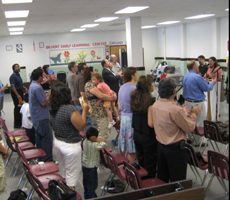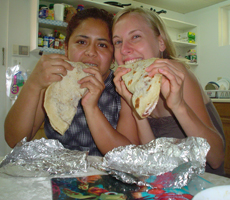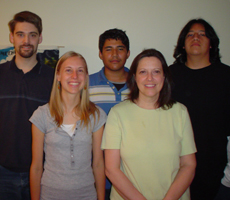Emily Derstine
emily.derstine@emu.edu
 As is evident throughout our culture, fast-paced American society is obsessed with getting the job done. Once work is finished we can enjoy some time of relaxation and socialization. Until then, though, we work hard to complete the task at hand without interruptions. We’ll follow the printed schedule without many deviations or spontaneity. While there is something positive to be said about the perseverance mentality, are we really getting the most out of life when we put our work before other important aspects of life, like relationships?
As is evident throughout our culture, fast-paced American society is obsessed with getting the job done. Once work is finished we can enjoy some time of relaxation and socialization. Until then, though, we work hard to complete the task at hand without interruptions. We’ll follow the printed schedule without many deviations or spontaneity. While there is something positive to be said about the perseverance mentality, are we really getting the most out of life when we put our work before other important aspects of life, like relationships?
Through my internship with Nueva Esperanza/New Hope, I can feel the pull in a different direction. Amidst the busyness of work and schedules, the pace of life seems to slow. In Latino culture, there is no need to rush off to the next activity or event. Instead, be content to sit, relax, and enjoy. Take in the present moment. When we’re finished visiting we will move on to the next appointment or finish the job we had started. It’s an event-based culture, not time- or task-driven. With this mindset, leaving partially-completed work to talk with a friend or neighbor does not have serious ramifications. The project will always be there; your friend may not. Placing more value on relationships and conversation over work of another sort allows us to form meaningful relationships with others and to spend time in conversation and cultivating friendships.
 This leisure helps put life in perspective for me. It’s also a stark contrast to the way I have operated. I enjoy finishing a task once I start it, I like punctuality, and appreciate having a plan and schedule for what the week will hold. Needless to say, this internship has been a learning experience for me in a whole variety of ways. Ever since my first day, I have observed that around Nueva Esperanza/New Hope, we just kind of go with the flow—with the slow, trickling current, lingering in each place seemingly much longer than necessary. This difference is helping me to reprioritize, and to act to it. Relationships are really what is most important in life.
This leisure helps put life in perspective for me. It’s also a stark contrast to the way I have operated. I enjoy finishing a task once I start it, I like punctuality, and appreciate having a plan and schedule for what the week will hold. Needless to say, this internship has been a learning experience for me in a whole variety of ways. Ever since my first day, I have observed that around Nueva Esperanza/New Hope, we just kind of go with the flow—with the slow, trickling current, lingering in each place seemingly much longer than necessary. This difference is helping me to reprioritize, and to act to it. Relationships are really what is most important in life.
I have had an incredible amount of new experiences, adventures, and surprises. I wouldn’t trade them—mostly because I am also a person who thrives on excitement. I enjoy breaks in the monotony of life to add fresh spark and flavor. Although these new experiences can be tough and are not always fun at the time, the sometimes-scary adventures and surprises often equal excitement. Constantly having a plan and sticking with a project until it’s completed may feel safe and reliable, but unwillingness to break from that fixed schedule may mean missed opportunities and fun times. Living a life of spontaneity and surprise gives you so many more stories and exciting memories than living a monotonous or simply comfortable lifestyle.
 My experience at Nueva Esperanza/New Hope in Suburban Washington, DC, therefore, is one of learning, surprise, and adventure. The upcoming events and gatherings almost always hold a certain amount of ambiguity, and the schedule is largely unpredictable, changing daily. But certain things stay the same: the emphasis on relationships, the time spent with one another, the desire to live in the moment. I hope to take with me this practice of striving to enjoy the present moment, placing greater value on the cultivation of relationships. We learn and grow and experience new things in talking with another. Let us not grow so focused on ourselves that we forget to spend time doing what is most important in life and truly living.
My experience at Nueva Esperanza/New Hope in Suburban Washington, DC, therefore, is one of learning, surprise, and adventure. The upcoming events and gatherings almost always hold a certain amount of ambiguity, and the schedule is largely unpredictable, changing daily. But certain things stay the same: the emphasis on relationships, the time spent with one another, the desire to live in the moment. I hope to take with me this practice of striving to enjoy the present moment, placing greater value on the cultivation of relationships. We learn and grow and experience new things in talking with another. Let us not grow so focused on ourselves that we forget to spend time doing what is most important in life and truly living.
Emily Derstine is one of over a dozen interns serving with Franconia Conference congregations, ministries, and partners. She’s a student at Eastern Mennonite University and a member of Plains Mennonite Church in Lansdale, PA.
Photos provided by Tim Moyer and Emily Derstine
The opinions expressed in articles posted on Mosaic’s website are those of the author and may not reflect the official policy of Mosaic Conference. Mosaic is a large conference, crossing ethnicities, geographies, generations, theologies, and politics. Each person can only speak for themselves; no one can represent “the conference.” May God give us the grace to hear what the Spirit is speaking to us through people with whom we disagree and the humility and courage to love one another even when those disagreements can’t be bridged.

Emily,
The readings for this Sunday have everything to do with finding out what is important in life.
A piece of your blog will be used in my sermon this week.
Blaine